uc/OS system transplantation and task implementation based on STM32F103
1. Establishment of stm32cubemx project
Select chip STM32C8

Configure RCC
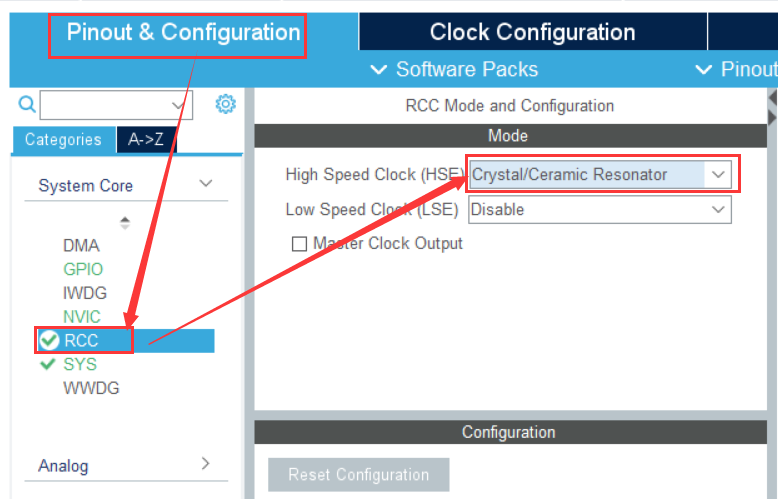
Configure SYS
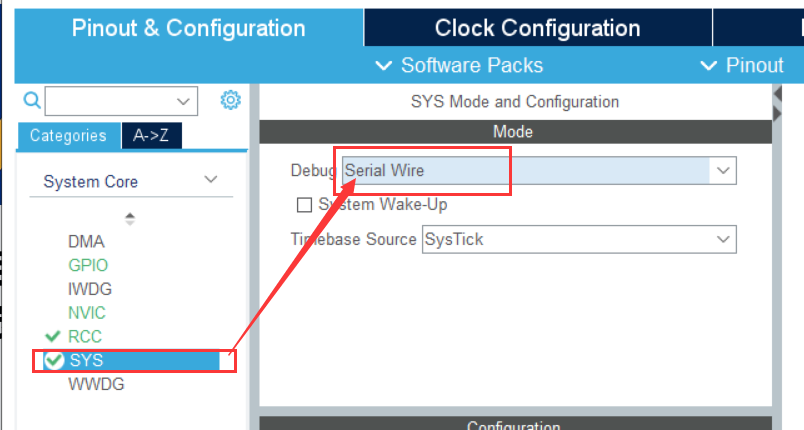
Set PB8 to GPIO_Output is used to light the LED lamp [PC13 is used later]
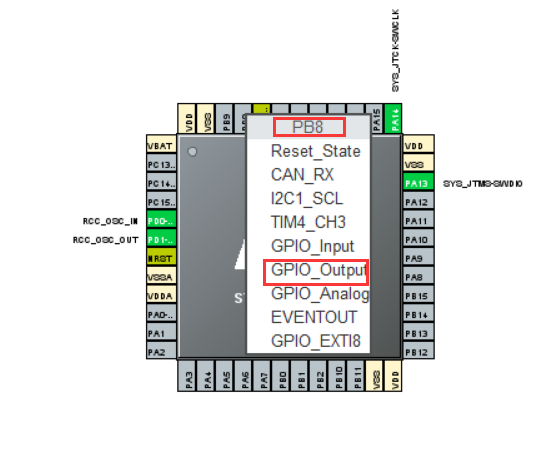
Set serial port USART1
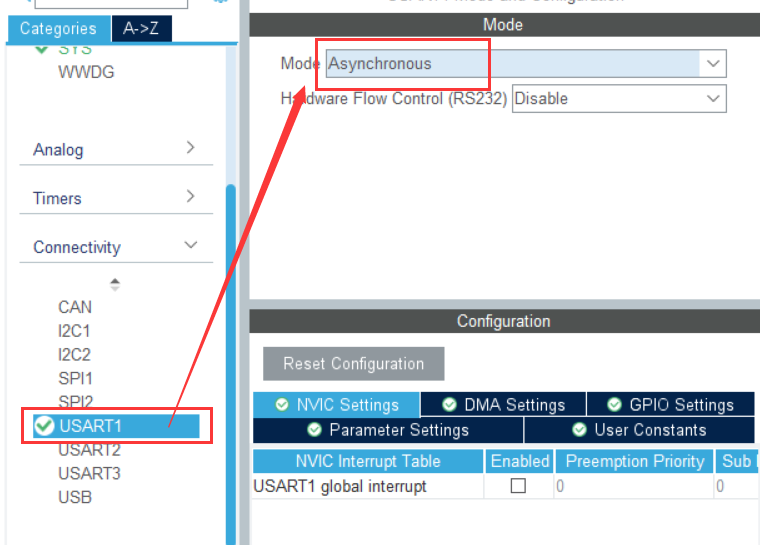
Project management: set the following options one by one
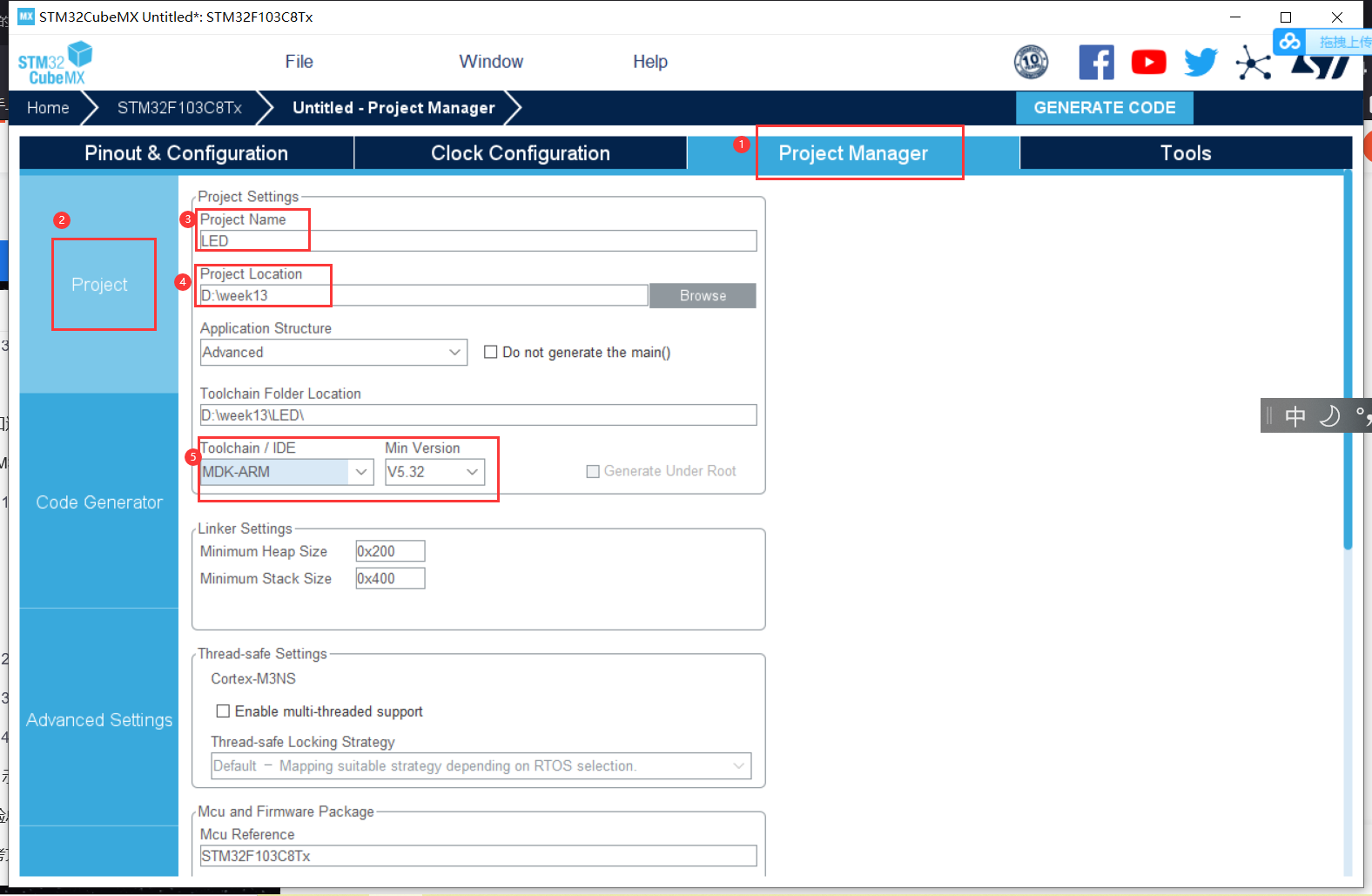
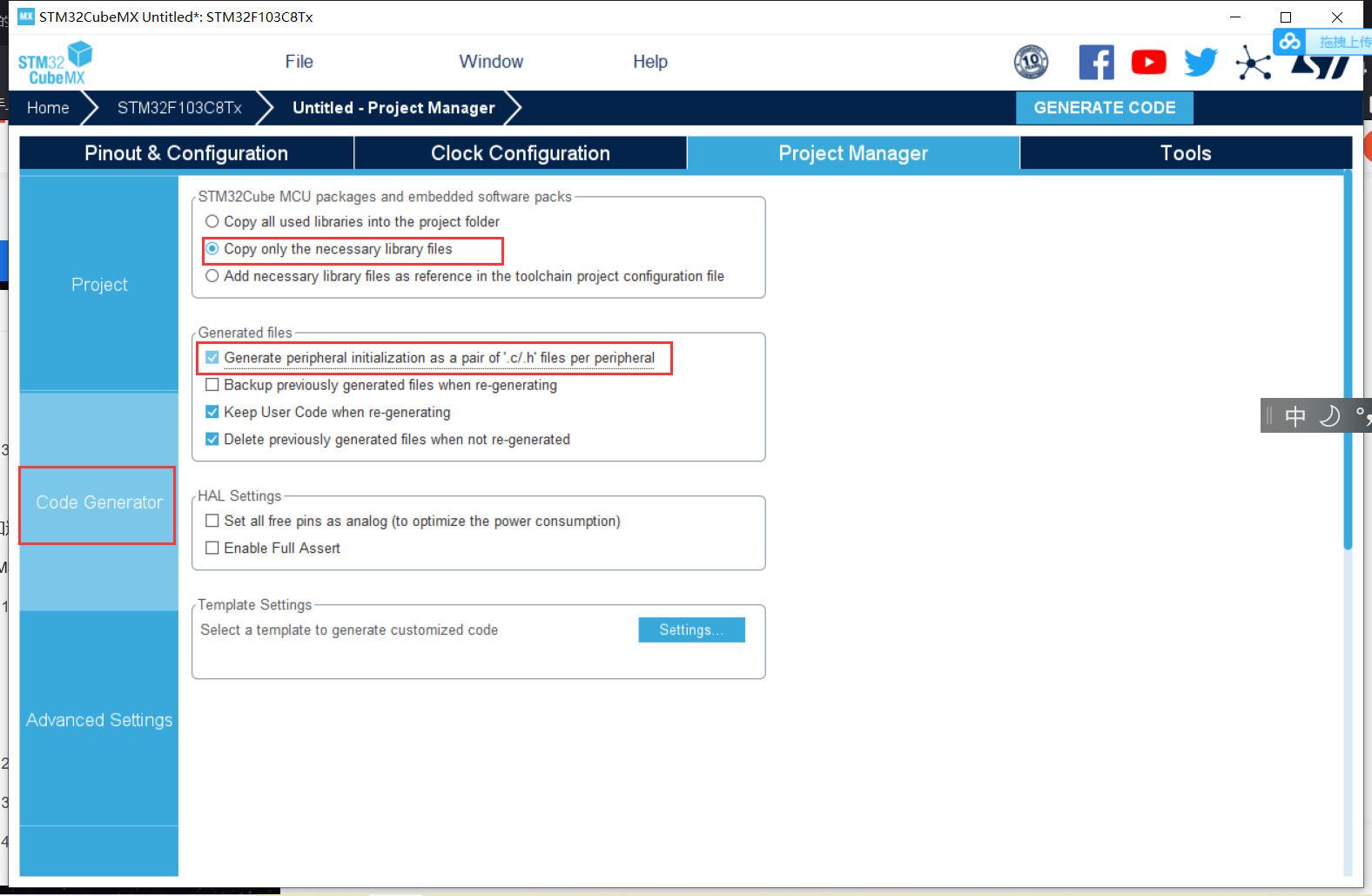 Click GENERATE CODE to GENERATE the project
Click GENERATE CODE to GENERATE the project

Click OpenProject to enter the Keil project file
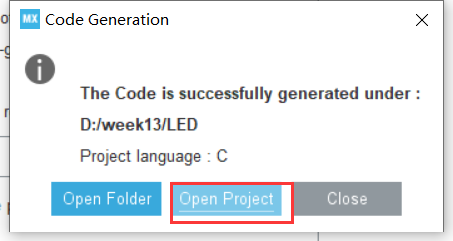
2 Keil engineering modification
2.1 modify code
Add the following loop statement in the main.c file:
while (1)
{
/* USER CODE END WHILE */
/* USER CODE BEGIN 3 */
HAL_GPIO_WritePin(GPIOB, GPIO_PIN_8, GPIO_PIN_SET);
HAL_Delay(500);
HAL_GPIO_WritePin(GPIOB, GPIO_PIN_8, GPIO_PIN_RESET);
HAL_Delay(500);
}
/* USER CODE END 3 */
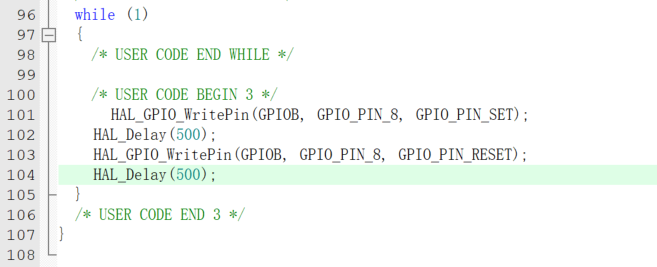
2.2 burning LED code
C8T6 burning, boot0-1, boot1-0.
F lymcu software burning:
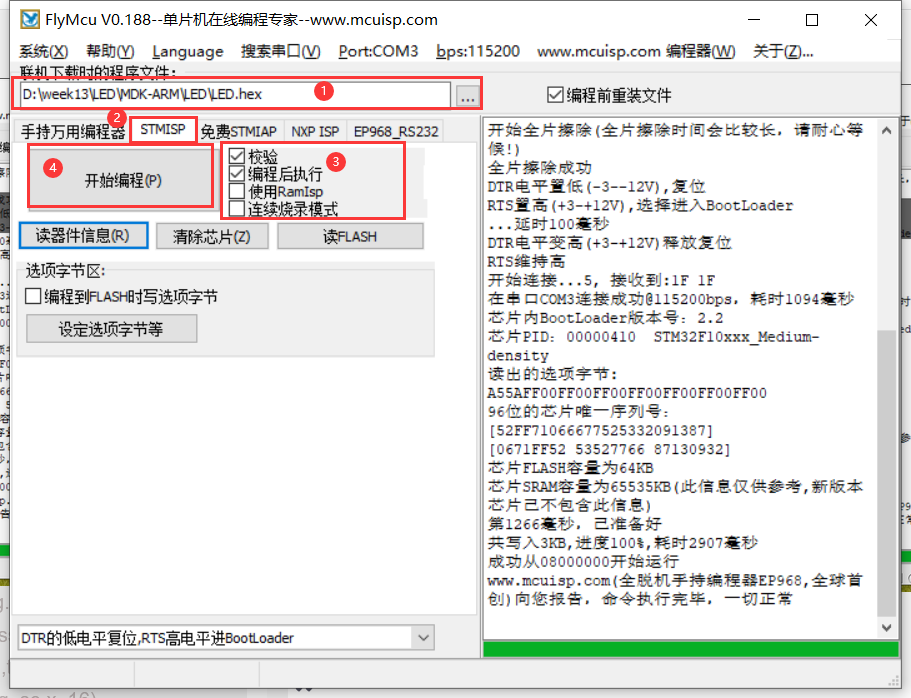
2.3 operation results
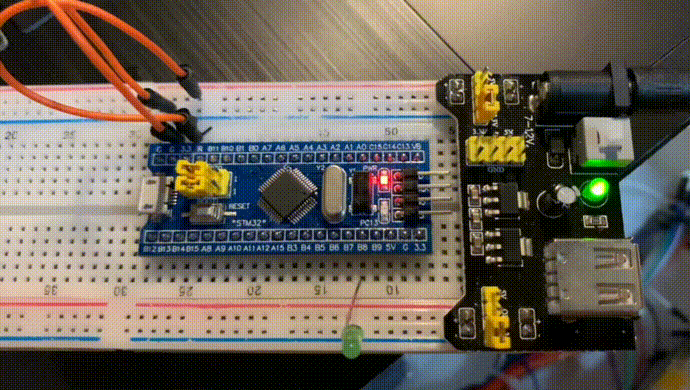 Note: there is no problem with the Keil file, so you can perform the following operations.
Note: there is no problem with the Keil file, so you can perform the following operations.
3 uc/OS system migration
3.1 download source code
Prepare uCOSIII source code: Download from the official website
Open the software file. The folders UC BSP and UC config are two newly created folders.
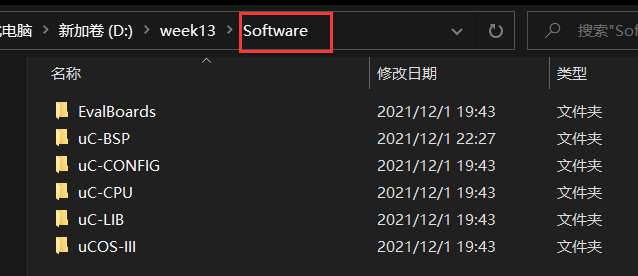
3.2 preparation of relevant documents
Create new bsp.c and bsp.h files for the UC BSP folder.
And add the following files to the folder UC config:
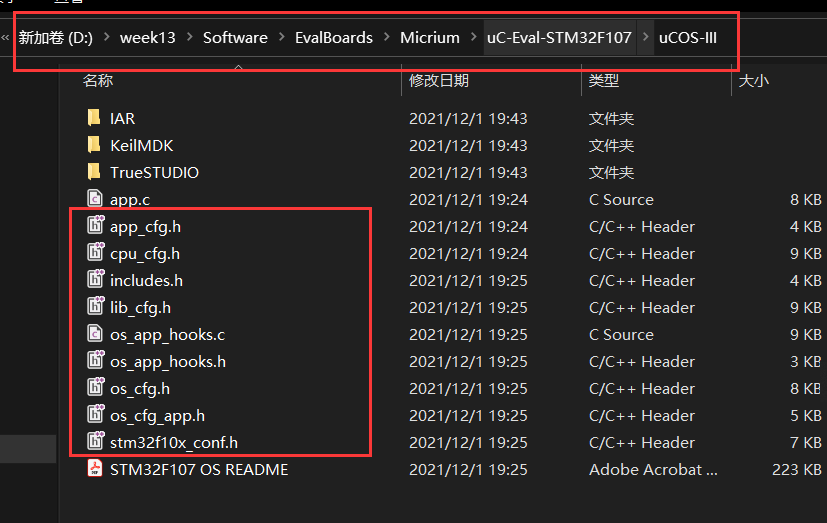
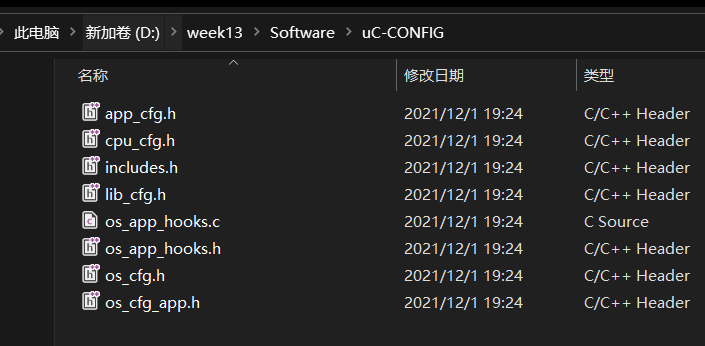 Copy the Software related files to the MDK-ARM folder of HAL project
Copy the Software related files to the MDK-ARM folder of HAL project
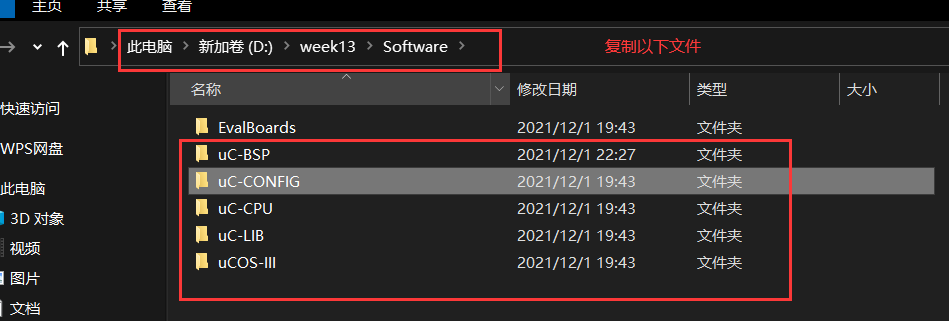
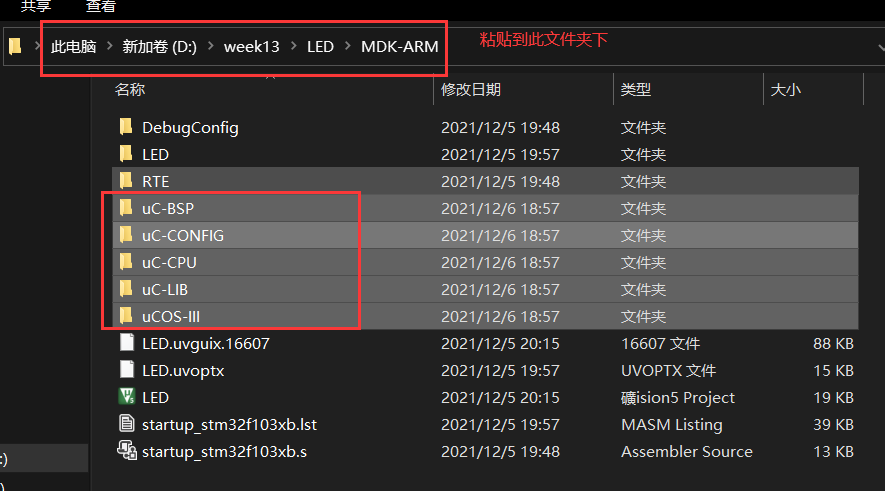
Go back to keil project file and create a new folder for the project (as shown in figure ② below)
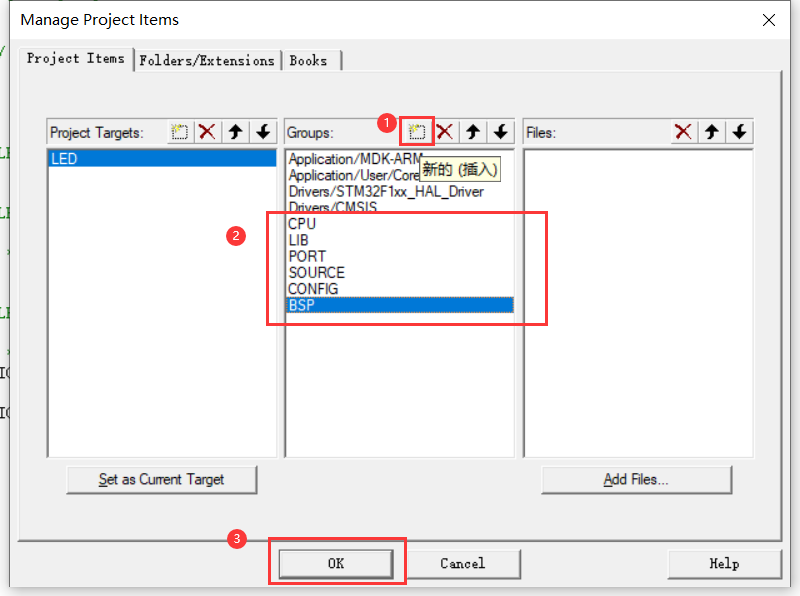 Add files to the new folder respectively:
Add files to the new folder respectively:
- CPU folder
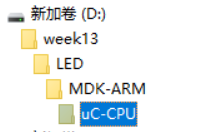
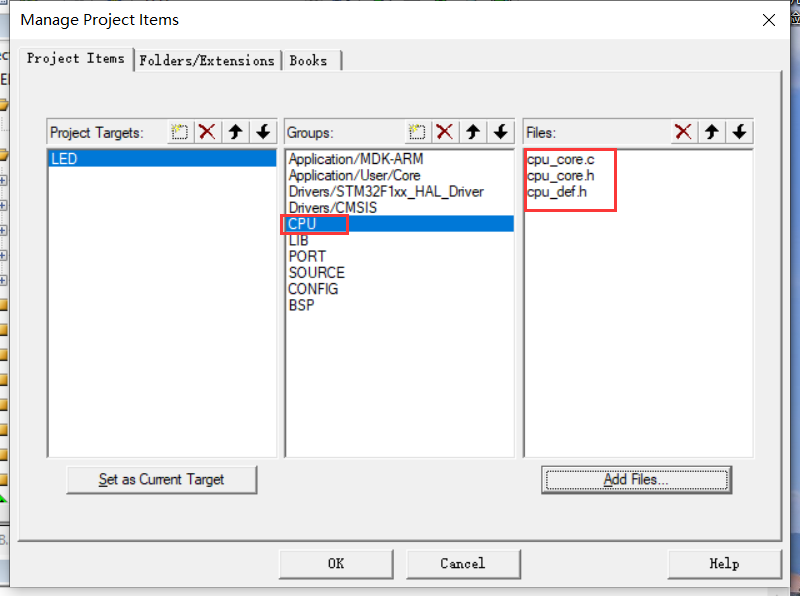
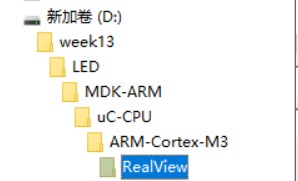
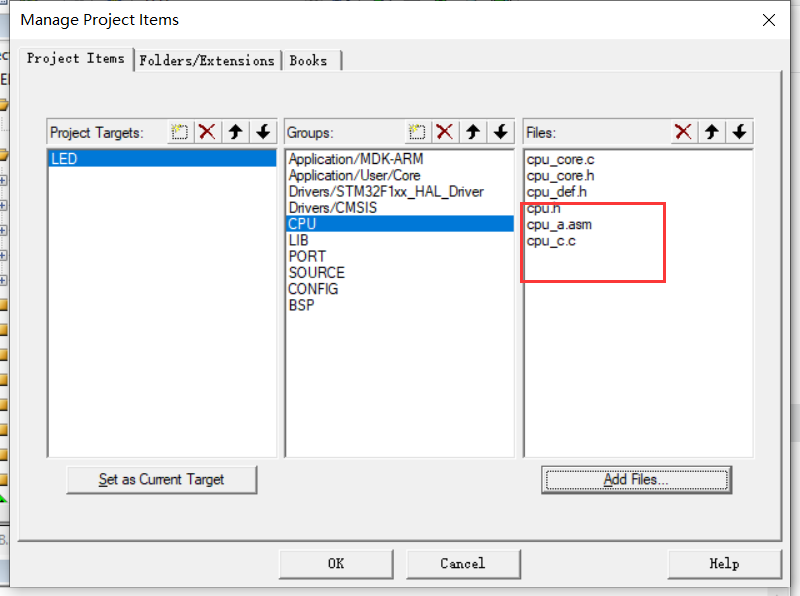
- LIB folder
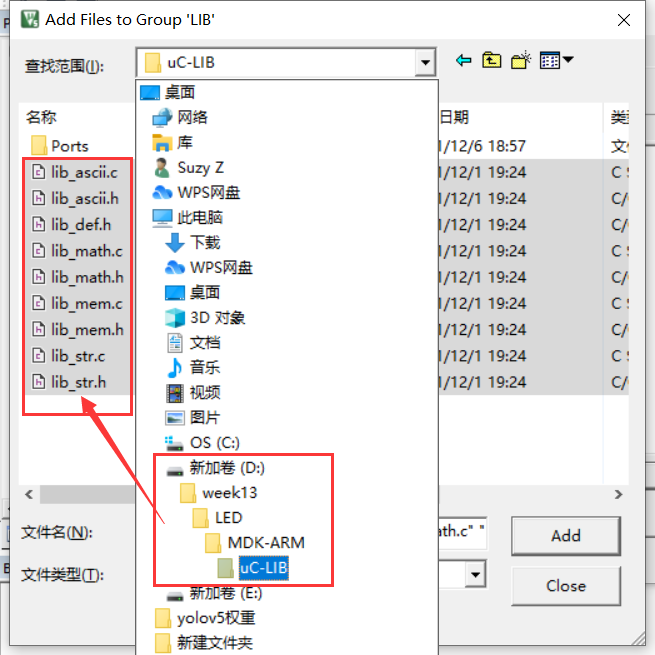
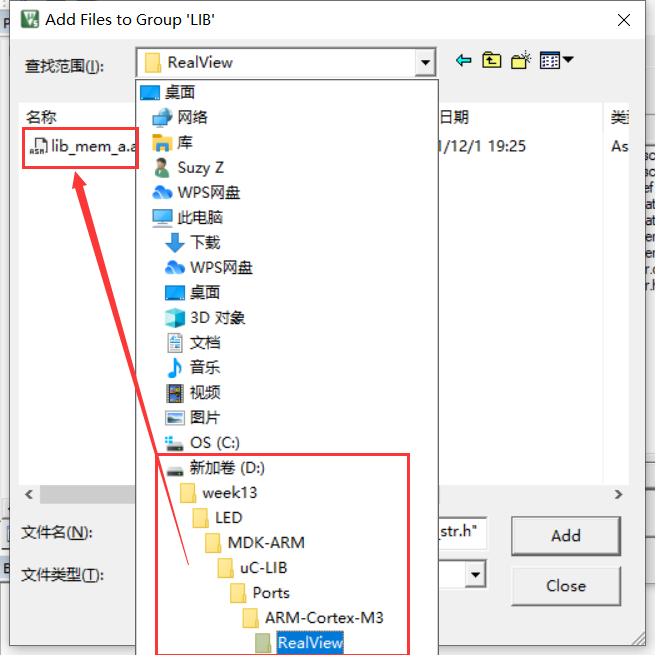
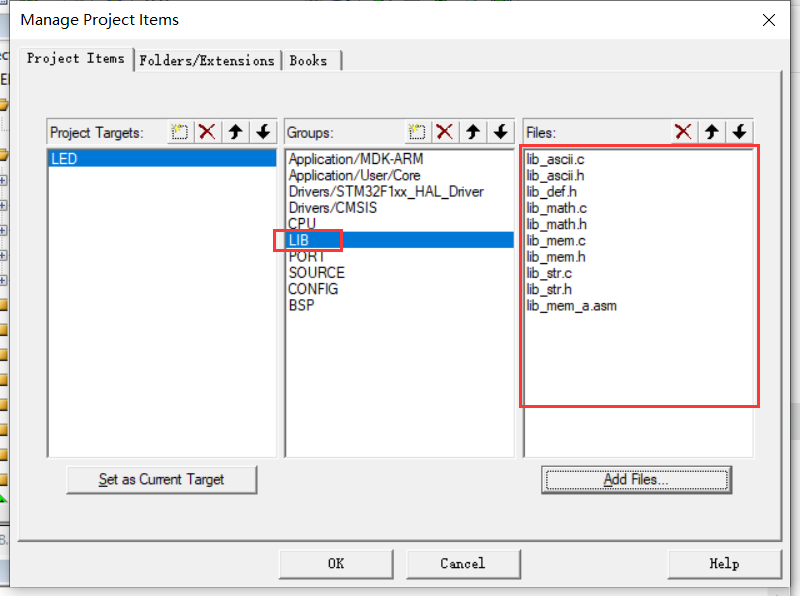
- PORT folder
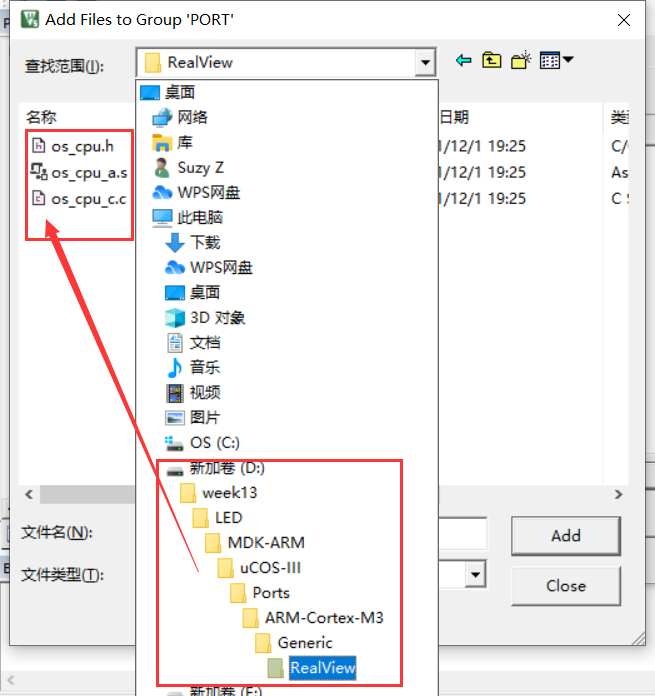
- SOURCE folder
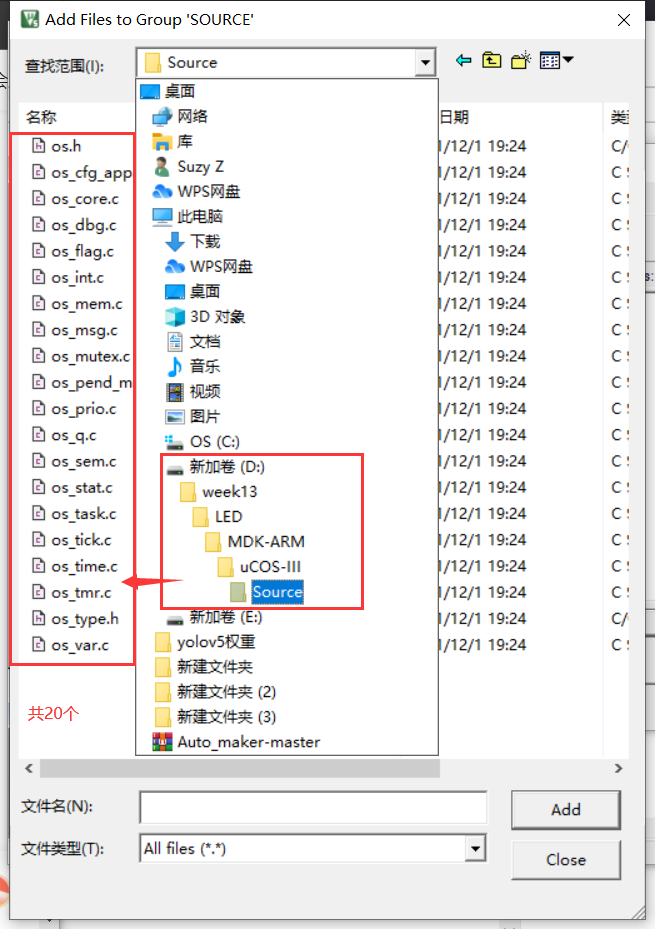
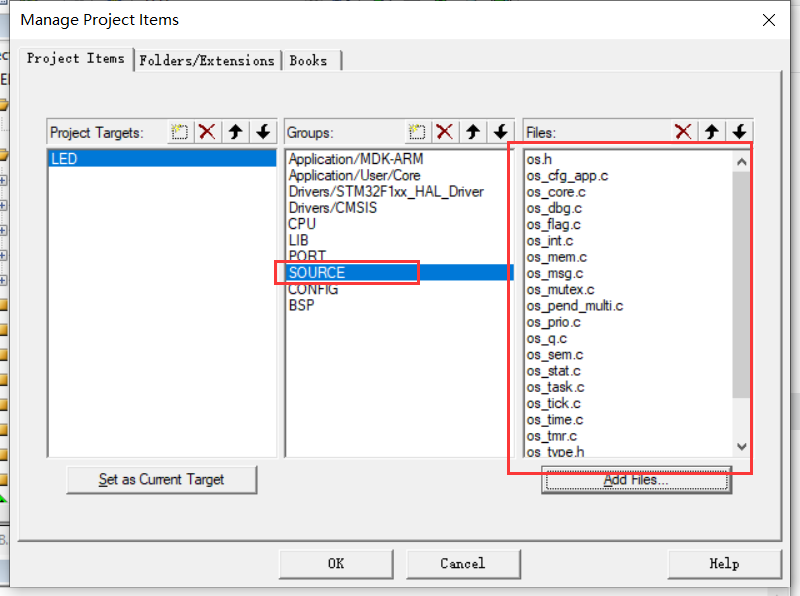
- CONFIG folder
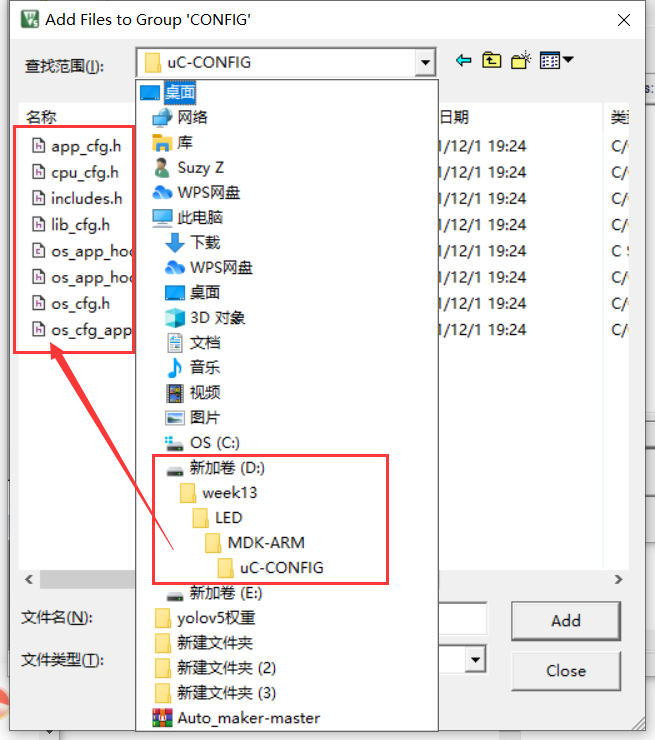
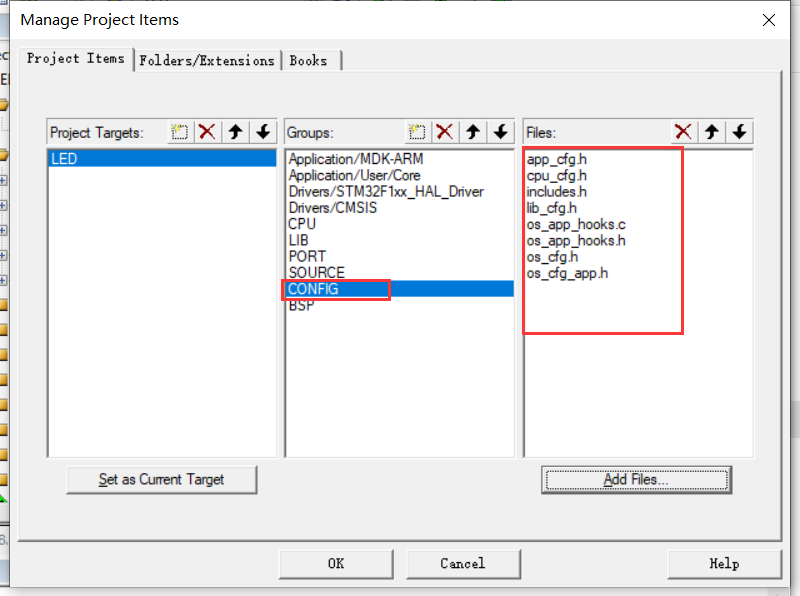
- BSP folder:
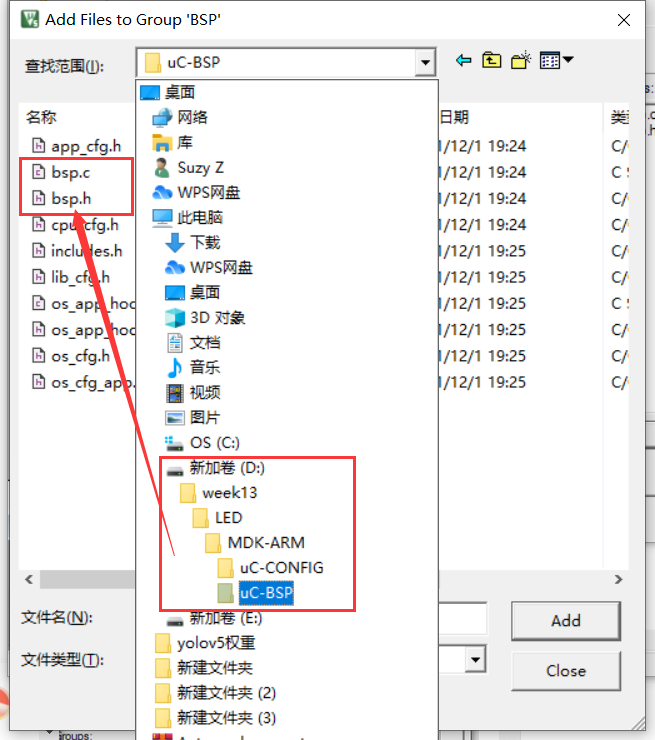
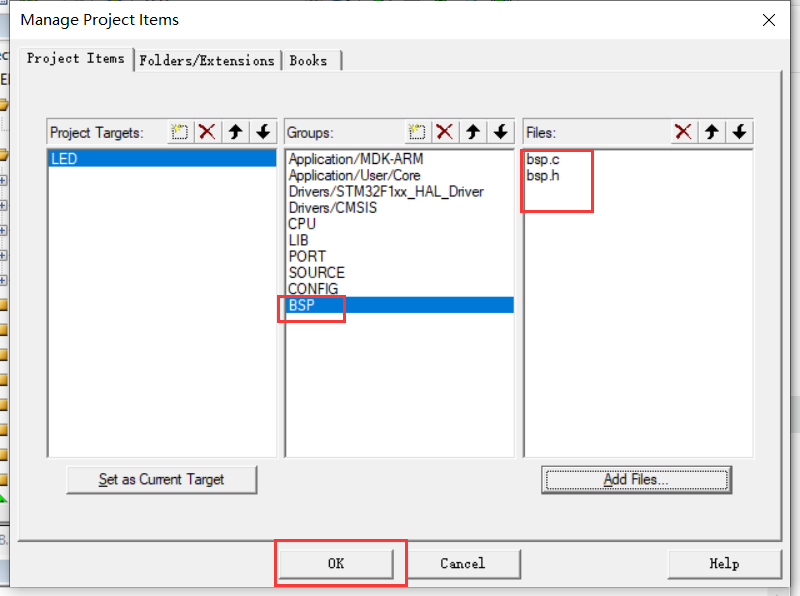
Be sure to click OK!
Project directory at this time:
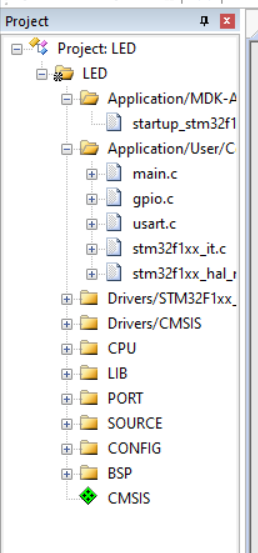
Import file path
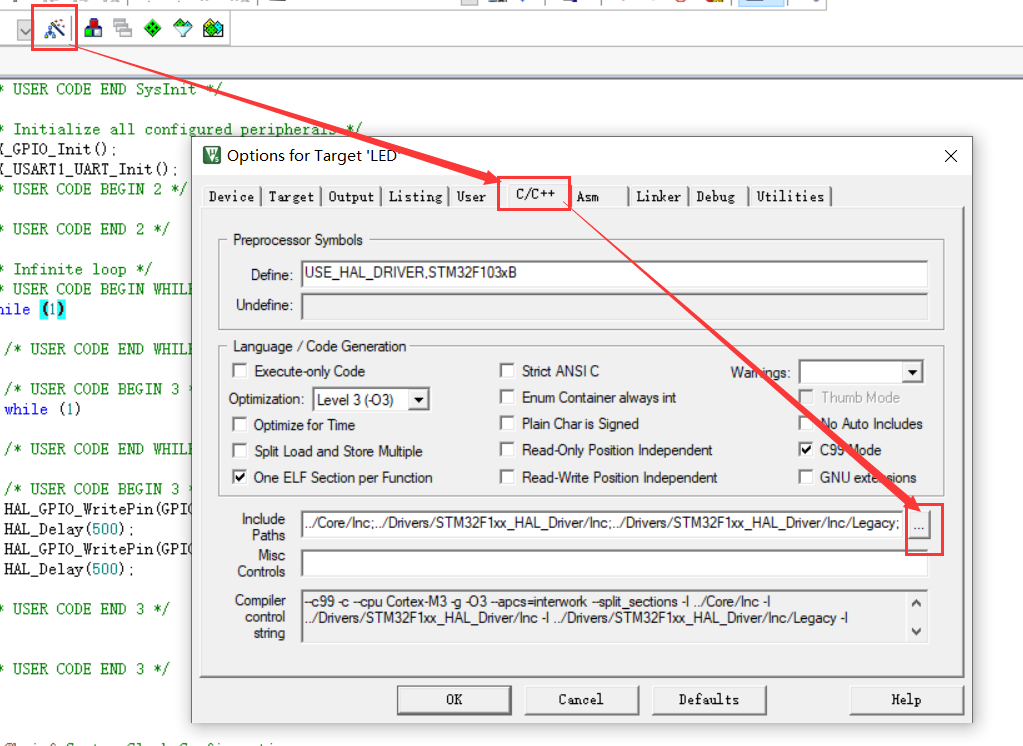
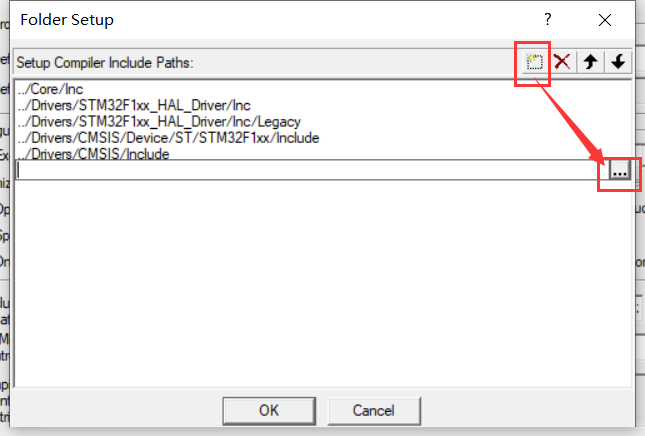
File path to import
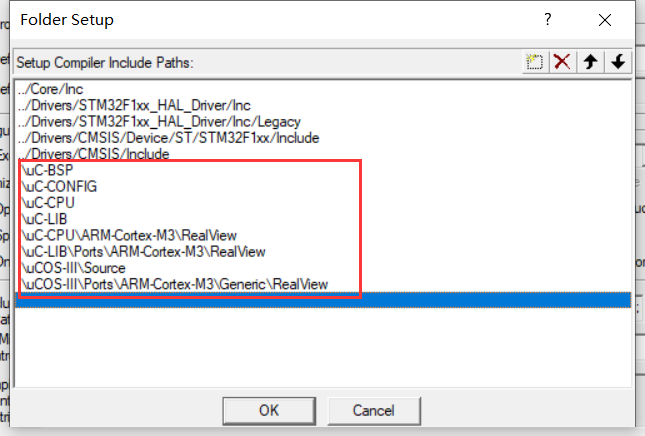
3.3 coding
-
Add code for the bsp.c and bsp.h files in the BSP folder
// bsp.h #ifndef __BSP_H__ #define __BSP_H__ #include "stm32f1xx_hal.h" void BSP_Init(void); #endif
// bsp.c #include "includes.h" #define DWT_CR *(CPU_REG32 *)0xE0001000 #define DWT_CYCCNT *(CPU_REG32 *)0xE0001004 #define DEM_CR *(CPU_REG32 *)0xE000EDFC #define DBGMCU_CR *(CPU_REG32 *)0xE0042004 #define DEM_CR_TRCENA (1 << 24) #define DWT_CR_CYCCNTENA (1 << 0) CPU_INT32U BSP_CPU_ClkFreq (void) { return HAL_RCC_GetHCLKFreq(); } void BSP_Tick_Init(void) { CPU_INT32U cpu_clk_freq; CPU_INT32U cnts; cpu_clk_freq = BSP_CPU_ClkFreq(); #if(OS_VERSION>=3000u) cnts = cpu_clk_freq/(CPU_INT32U)OSCfg_TickRate_Hz; #else cnts = cpu_clk_freq/(CPU_INT32U)OS_TICKS_PER_SEC; #endif OS_CPU_SysTickInit(cnts); } void BSP_Init(void) { BSP_Tick_Init(); MX_GPIO_Init(); } #if (CPU_CFG_TS_TMR_EN == DEF_ENABLED) void CPU_TS_TmrInit (void) { CPU_INT32U cpu_clk_freq_hz; DEM_CR |= (CPU_INT32U)DEM_CR_TRCENA; /* Enable Cortex-M3's DWT CYCCNT reg. */ DWT_CYCCNT = (CPU_INT32U)0u; DWT_CR |= (CPU_INT32U)DWT_CR_CYCCNTENA; cpu_clk_freq_hz = BSP_CPU_ClkFreq(); CPU_TS_TmrFreqSet(cpu_clk_freq_hz); } #endif #if (CPU_CFG_TS_TMR_EN == DEF_ENABLED) CPU_TS_TMR CPU_TS_TmrRd (void) { return ((CPU_TS_TMR)DWT_CYCCNT); } #endif #if (CPU_CFG_TS_32_EN == DEF_ENABLED) CPU_INT64U CPU_TS32_to_uSec (CPU_TS32 ts_cnts) { CPU_INT64U ts_us; CPU_INT64U fclk_freq; fclk_freq = BSP_CPU_ClkFreq(); ts_us = ts_cnts / (fclk_freq / DEF_TIME_NBR_uS_PER_SEC); return (ts_us); } #endif #if (CPU_CFG_TS_64_EN == DEF_ENABLED) CPU_INT64U CPU_TS64_to_uSec (CPU_TS64 ts_cnts) { CPU_INT64U ts_us; CPU_INT64U fclk_freq; fclk_freq = BSP_CPU_ClkFreq(); ts_us = ts_cnts / (fclk_freq / DEF_TIME_NBR_uS_PER_SEC); return (ts_us); } #endif -
Modify the main.c code
------------------------------------------------------------------*/ #include "main.h" #include "gpio.h" #include "usart.h" /* Private includes ----------------------------------------------------------*/ /* USER CODE BEGIN Includes */ #include <includes.h> #include "stm32f1xx_hal.h" /* USER CODE END Includes */ /* Private typedef -----------------------------------------------------------*/ /* USER CODE BEGIN PTD */ /* USER CODE END PTD */ /* Private define ------------------------------------------------------------*/ /* USER CODE BEGIN PD */ /* Task priority */ #define START_TASK_PRIO 3 #define LED0_TASK_PRIO 4 #define MSG_TASK_PRIO 5 /* Task stack size */ #define START_STK_SIZE 64 #define LED0_STK_SIZE 64 #define MSG_STK_SIZE 64 / / if the task heap size is too large, an error will be reported. You can try to make it smaller /* Task stack */ CPU_STK START_TASK_STK[START_STK_SIZE]; CPU_STK LED0_TASK_STK[LED0_STK_SIZE]; CPU_STK MSG_TASK_STK[MSG_STK_SIZE]; /* Task control block */ OS_TCB StartTaskTCB; OS_TCB Led0TaskTCB; OS_TCB MsgTaskTCB; /* USER CODE END PD */ /* Private macro -------------------------------------------------------------*/ /* USER CODE BEGIN PM */ /* USER CODE END PM */ /* Private variables ---------------------------------------------------------*/ /* USER CODE BEGIN PV */ /* Task function definition */ void start_task(void *p_arg); static void AppTaskCreate(void); static void AppObjCreate(void); static void led_pc13(void *p_arg); static void send_msg(void *p_arg); /* USER CODE END PV */ /* Private function prototypes -----------------------------------------------*/ void SystemClock_Config(void); /* USER CODE BEGIN PFP */ /* USER CODE END PFP */ /* Private user code ---------------------------------------------------------*/ /* USER CODE BEGIN 0 */ /** * @brief System Clock Configuration * @retval None */ void SystemClock_Config(void) { RCC_OscInitTypeDef RCC_OscInitStruct = {0}; RCC_ClkInitTypeDef RCC_ClkInitStruct = {0}; /**Initializes the CPU, AHB and APB busses clocks */ RCC_OscInitStruct.OscillatorType = RCC_OSCILLATORTYPE_HSE; RCC_OscInitStruct.HSEState = RCC_HSE_ON; RCC_OscInitStruct.HSEPredivValue = RCC_HSE_PREDIV_DIV1; RCC_OscInitStruct.HSIState = RCC_HSI_ON; RCC_OscInitStruct.PLL.PLLState = RCC_PLL_ON; RCC_OscInitStruct.PLL.PLLSource = RCC_PLLSOURCE_HSE; RCC_OscInitStruct.PLL.PLLMUL = RCC_PLL_MUL9; if (HAL_RCC_OscConfig(&RCC_OscInitStruct) != HAL_OK) { Error_Handler(); } /**Initializes the CPU, AHB and APB busses clocks */ RCC_ClkInitStruct.ClockType = RCC_CLOCKTYPE_HCLK|RCC_CLOCKTYPE_SYSCLK |RCC_CLOCKTYPE_PCLK1|RCC_CLOCKTYPE_PCLK2; RCC_ClkInitStruct.SYSCLKSource = RCC_SYSCLKSOURCE_PLLCLK; RCC_ClkInitStruct.AHBCLKDivider = RCC_SYSCLK_DIV1; RCC_ClkInitStruct.APB1CLKDivider = RCC_HCLK_DIV2; RCC_ClkInitStruct.APB2CLKDivider = RCC_HCLK_DIV1; if (HAL_RCC_ClockConfig(&RCC_ClkInitStruct, FLASH_LATENCY_2) != HAL_OK) { Error_Handler(); } } /* USER CODE END 0 */ /** * @brief The application entry point. * @retval int */ int main(void) { OS_ERR err; OSInit(&err); HAL_Init(); SystemClock_Config(); //MX_GPIO_Init(); This will also be initialized in BSP initialization MX_USART1_UART_Init(); /* Create task */ OSTaskCreate((OS_TCB *)&StartTaskTCB, /* Create the start task */ (CPU_CHAR *)"start task", (OS_TASK_PTR ) start_task, (void *) 0, (OS_PRIO ) START_TASK_PRIO, (CPU_STK *)&START_TASK_STK[0], (CPU_STK_SIZE) START_STK_SIZE/10, (CPU_STK_SIZE) START_STK_SIZE, (OS_MSG_QTY ) 0, (OS_TICK ) 0, (void *) 0, (OS_OPT )(OS_OPT_TASK_STK_CHK | OS_OPT_TASK_STK_CLR), (OS_ERR *)&err); /* Start the multitasking system and give control to uC/OS-III */ OSStart(&err); /* Start multitasking (i.e. give control to uC/OS-III). */ } void start_task(void *p_arg) { OS_ERR err; CPU_SR_ALLOC(); p_arg = p_arg; /* YangJie add 2021.05.20*/ BSP_Init(); /* Initialize BSP functions */ //CPU_Init(); //Mem_Init(); /* Initialize Memory Management Module */ #if OS_ CFG_ STAT_ TASK_ EN > 0u OSStatTaskCPUUsageInit(&err); // Statistical tasks #endif #ifdef CPU_CFG_INT_DIS_MEAS_EN // If enabled, measure the interrupt off time CPU_IntDisMeasMaxCurReset(); #endif #if OS_CFG_SCHED_ROUND_ROBIN_EN // When using time slice rotation // Enable the time slice rotation scheduling function. The time slice length is 1 system clock beat, i.e. 1*5=5ms OSSchedRoundRobinCfg(DEF_ENABLED,1,&err); #endif OS_CRITICAL_ENTER(); // Enter critical zone /* Create LED0 task*/ OSTaskCreate((OS_TCB * )& Led0TaskTCB, (CPU_CHAR * )"led_pc13", (OS_TASK_PTR )led_pc13, (void * )0, (OS_PRIO )LED0_TASK_PRIO, (CPU_STK * )&LED0_TASK_STK[0], (CPU_STK_SIZE)LED0_STK_SIZE/10, (CPU_STK_SIZE)LED0_STK_SIZE, (OS_MSG_QTY )0, (OS_TICK )0, (void * )0, (OS_OPT )OS_OPT_TASK_STK_CHK|OS_OPT_TASK_STK_CLR, (OS_ERR * )&err); /* Create LED1 task */ OSTaskCreate((OS_TCB * )&MsgTaskTCB, (CPU_CHAR * )"send_msg", (OS_TASK_PTR )send_msg, (void * )0, (OS_PRIO )MSG_TASK_PRIO, (CPU_STK * )&MSG_TASK_STK[0], (CPU_STK_SIZE)MSG_STK_SIZE/10, (CPU_STK_SIZE)MSG_STK_SIZE, (OS_MSG_QTY )0, (OS_TICK )0, (void * )0, (OS_OPT )OS_OPT_TASK_STK_CHK|OS_OPT_TASK_STK_CLR, (OS_ERR * )&err); OS_TaskSuspend((OS_TCB*)&StartTaskTCB,&err); //Suspend start task OS_CRITICAL_EXIT(); // Enter the critical area} / * * function function: start the task function body. * input parameters: p_arg Is a formal parameter passed when the task is created * Return value: nothing * say Ming: None */ static void led_pc13 (void *p_arg) { OS_ERR err; (void)p_arg; BSP_Init(); /* Initialize BSP functions */ CPU_Init(); Mem_Init(); /* Initialize Memory Management Module */ #if OS_CFG_STAT_TASK_EN > 0u OSStatTaskCPUUsageInit(&err); /* Compute CPU capacity with no task running */ #endif CPU_IntDisMeasMaxCurReset(); AppTaskCreate(); /* Create Application Tasks */ AppObjCreate(); /* Create Application Objects */ while (DEF_TRUE) { HAL_GPIO_WritePin(GPIOC,GPIO_PIN_13,GPIO_PIN_RESET); OSTimeDlyHMSM(0, 0, 0, 500,OS_OPT_TIME_HMSM_STRICT,&err); HAL_GPIO_WritePin(GPIOC,GPIO_PIN_13,GPIO_PIN_SET); OSTimeDlyHMSM(0, 0, 0, 500,OS_OPT_TIME_HMSM_STRICT,&err); /* USER CODE END WHILE */ /* USER CODE BEGIN 3 */ } /* USER CODE END 3 */ } static void send_msg (void *p_arg) { OS_ERR err; (void)p_arg; BSP_Init(); /* Initialize BSP functions */ CPU_Init(); Mem_Init(); /* Initialize Memory Management Module */ #if OS_CFG_STAT_TASK_EN > 0u OSStatTaskCPUUsageInit(&err); /* Compute CPU capacity with no task running */ #endif CPU_IntDisMeasMaxCurReset(); AppTaskCreate(); /* Create Application Tasks */ AppObjCreate(); /* Create Application Objects */ while (DEF_TRUE) { printf("hello world \r\n"); OSTimeDlyHMSM(0, 0, 0, 500,OS_OPT_TIME_HMSM_STRICT,&err); /* USER CODE END WHILE */ /* USER CODE BEGIN 3 */ } /* USER CODE END 3 */ } /* USER CODE BEGIN 4 */ /** * Function function: create application task * input parameter: p_arg Is the formal parameter passed when creating the task * return value: none * Description: None */ static void AppTaskCreate (void) { } /** * Function function: uCOSIII kernel object creation * input parameters: none * return value: none * Description: None */ static void AppObjCreate (void) { } /* USER CODE END 4 */ /** * @brief This function is executed in case of error occurrence. * @retval None */ void Error_Handler(void) { /* USER CODE BEGIN Error_Handler_Debug */ /* User can add his own implementation to report the HAL error return state */ /* USER CODE END Error_Handler_Debug */ } #ifdef USE_FULL_ASSERT /** * @brief Reports the name of the source file and the source line number * where the assert_param error has occurred. * @param file: pointer to the source file name * @param line: assert_param error line source number * @retval None */ void assert_failed(uint8_t *file, uint32_t line) { /* USER CODE BEGIN 6 */ /* User can add his own implementation to report the file name and line number, tex: printf("Wrong parameters value: file %s on line %d\r\n", file, line) */ /* USER CODE END 6 */ } #endif /* USE_FULL_ASSERT */ /************************ (C) COPYRIGHT STMicroelectronics *****END OF FILE****/ -

Change PendSV_Handler and SysTick_Handler to
OS_CPU_PendSVHandler and OS_CPU_SysTickHandler

-

Change DEF_ENABLED to
DEF_DISABLED Add #define app#u trace bsp#ser#u printf
Add #define app#u trace bsp#ser#u printf
Change to #define APP_TRACE (void)

-
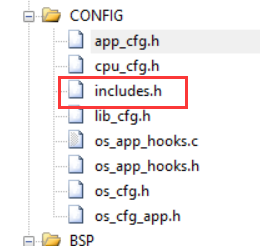
Add #include "gpio.h" and
#include "app_cfg.h"
Change #include < stm32f10x_lib. H > to #include "stm32f1xx_hal.h"

-
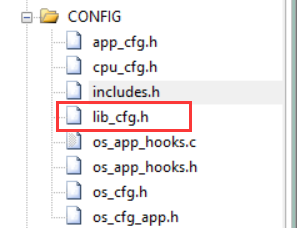
Change the number here to
5u is enough

-
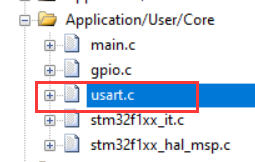
Add code here
/* USER CODE BEGIN 1 */
typedef struct __FILE FILE;
int fputc(int ch,FILE *f){
HAL_UART_Transmit(&huart1,(uint8_t *)&ch,1,0xffff);
return ch;
}
/* USER CODE END 1 */
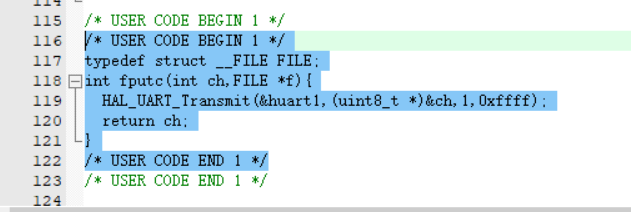
3.4 configuration parameters
Click "magic wand"
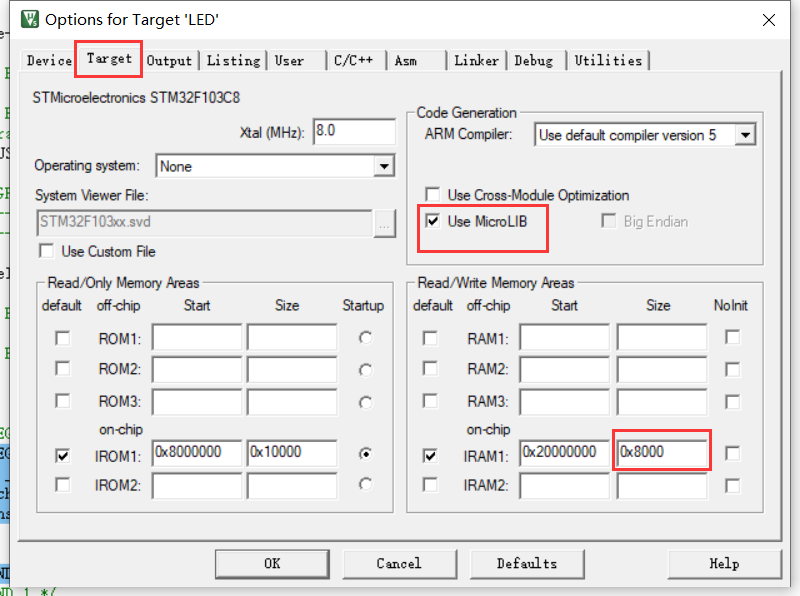
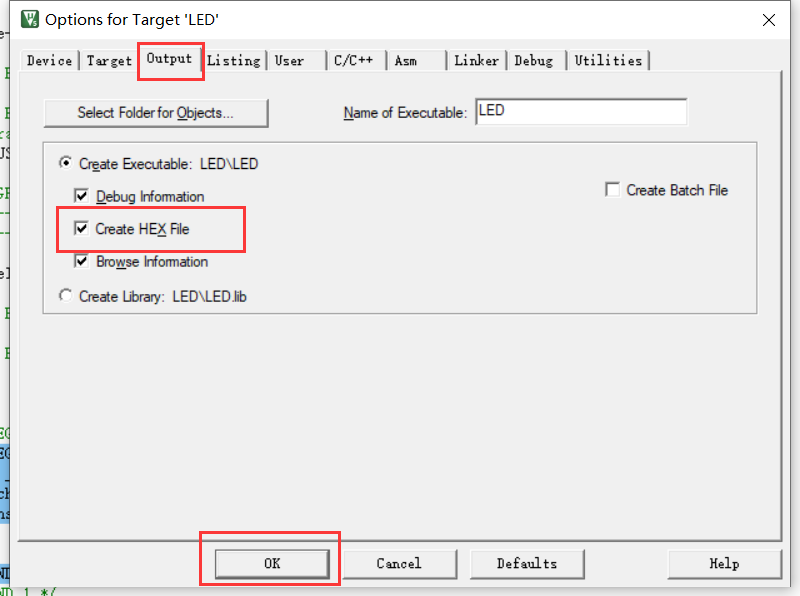
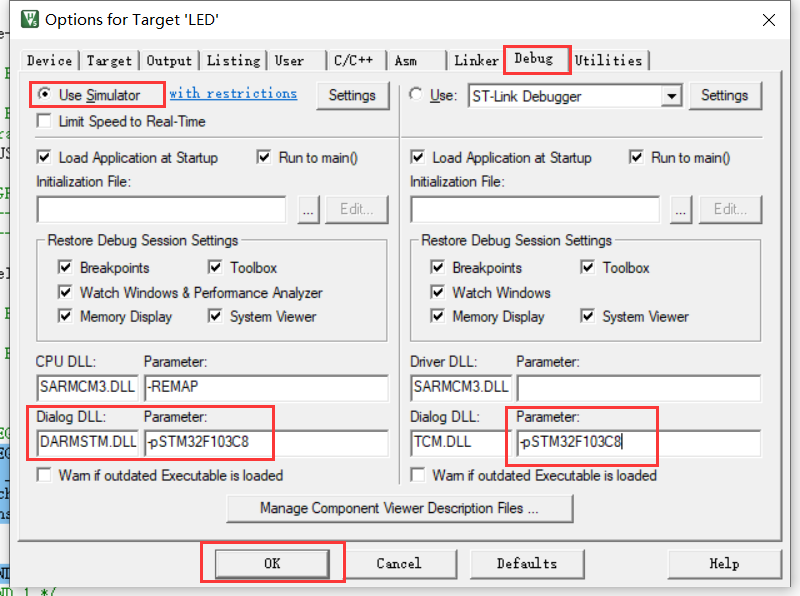
3.5 compilation and operation
Compile build:
 No error!
No error!
Operation results after burning:
LED flashing
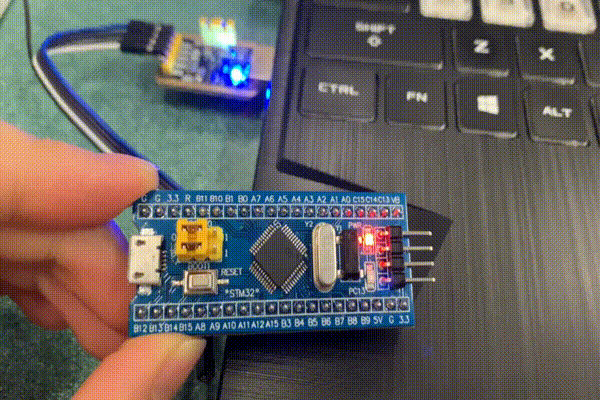
Serial port sending data
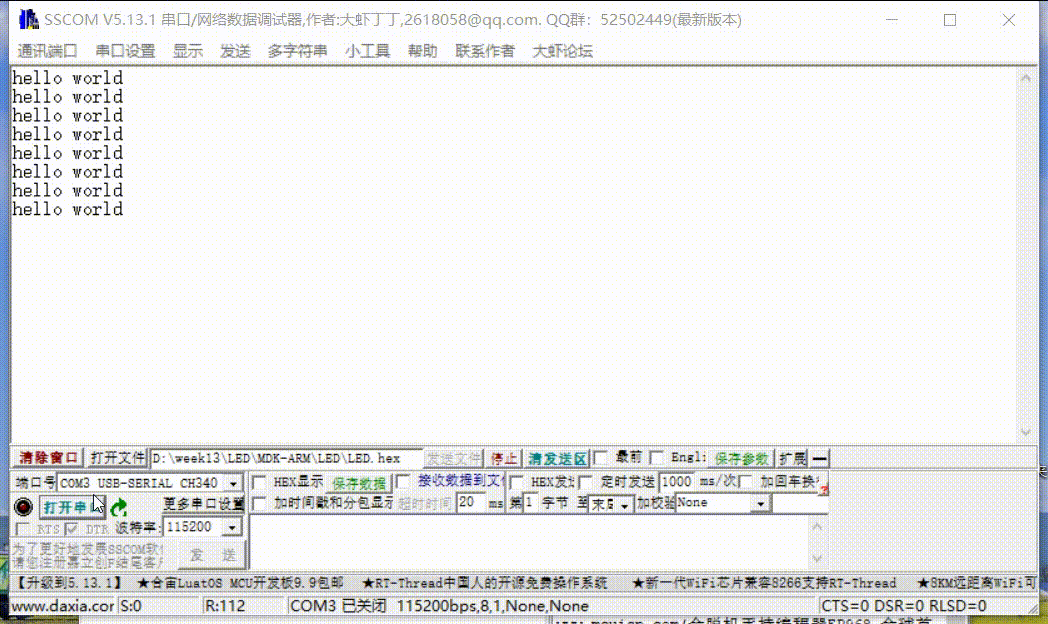
4 three tasks
Three tasks: two of them control the LED on-off in 1s and 3s cycles respectively; the other task sends "hello uc/OS! Welcome to RTOS multitasking environment!" through the serial port in 2s cycles.
4.1 code modification
To modify the code in gpio.c file is to modify, not copy and paste all. You can comment out the previous code. (add initialization PA3)
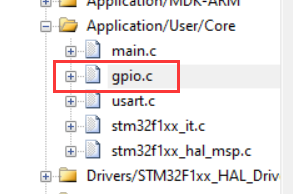
void MX_GPIO_Init(void)
{
GPIO_InitTypeDef GPIO_InitStruct = {0};
/* GPIO Ports Clock Enable */
__HAL_RCC_GPIOC_CLK_ENABLE();
__HAL_RCC_GPIOD_CLK_ENABLE();
__HAL_RCC_GPIOA_CLK_ENABLE();
/*Configure GPIO pin Output Level */
HAL_GPIO_WritePin(GPIOC, GPIO_PIN_13, GPIO_PIN_RESET);
HAL_GPIO_WritePin(GPIOA, GPIO_PIN_3, GPIO_PIN_RESET);
/*Configure GPIO pin : PC13|PA3 */
GPIO_InitStruct.Pin = GPIO_PIN_13|GPIO_PIN_3;
GPIO_InitStruct.Mode = GPIO_MODE_OUTPUT_PP;
GPIO_InitStruct.Pull = GPIO_NOPULL;
GPIO_InitStruct.Speed = GPIO_SPEED_FREQ_LOW;
HAL_GPIO_Init(GPIOC, &GPIO_InitStruct);
HAL_GPIO_Init(GPIOA, &GPIO_InitStruct);
}
Modify the main.c code (be careful not to forget the header file)
/* Private define ------------------------------------------------------------*/
/* USER CODE BEGIN PD */
/* Task priority */
#define START_TASK_PRIO 3
#define LED0_TASK_PRIO 4
#define MSG_TASK_PRIO 5
#define LED1_TASK_PRIO 6
/* Task stack size */
#define START_STK_SIZE 96
#define LED0_STK_SIZE 64
#define MSG_STK_SIZE 64
#define LED1_STK_SIZE 64
/* Task stack */
CPU_STK START_TASK_STK[START_STK_SIZE];
CPU_STK LED0_TASK_STK[LED0_STK_SIZE];
CPU_STK MSG_TASK_STK[MSG_STK_SIZE];
CPU_STK LED1_TASK_STK[LED1_STK_SIZE];
/* Task control block */
OS_TCB StartTaskTCB;
OS_TCB Led0TaskTCB;
OS_TCB MsgTaskTCB;
OS_TCB Led1TaskTCB;
/* USER CODE END PD */
/* Private macro -------------------------------------------------------------*/
/* USER CODE BEGIN PM */
/* USER CODE END PM */
/* Private variables ---------------------------------------------------------*/
/* USER CODE BEGIN PV */
/* Task function definition */
void start_task(void *p_arg);
static void AppTaskCreate(void);
static void AppObjCreate(void);
static void led_pc13(void *p_arg);
static void send_msg(void *p_arg);
static void led_pa3(void *p_arg);
/* USER CODE END PV */
/* Private function prototypes -----------------------------------------------*/
void SystemClock_Config(void);
/* USER CODE BEGIN PFP */
/* USER CODE END PFP */
/* Private user code ---------------------------------------------------------*/
/* USER CODE BEGIN 0 */
/**
* @brief System Clock Configuration
* @retval None
*/
void SystemClock_Config(void)
{
RCC_OscInitTypeDef RCC_OscInitStruct = {0};
RCC_ClkInitTypeDef RCC_ClkInitStruct = {0};
/**Initializes the CPU, AHB and APB busses clocks
*/
RCC_OscInitStruct.OscillatorType = RCC_OSCILLATORTYPE_HSE;
RCC_OscInitStruct.HSEState = RCC_HSE_ON;
RCC_OscInitStruct.HSEPredivValue = RCC_HSE_PREDIV_DIV1;
RCC_OscInitStruct.HSIState = RCC_HSI_ON;
RCC_OscInitStruct.PLL.PLLState = RCC_PLL_ON;
RCC_OscInitStruct.PLL.PLLSource = RCC_PLLSOURCE_HSE;
RCC_OscInitStruct.PLL.PLLMUL = RCC_PLL_MUL9;
if (HAL_RCC_OscConfig(&RCC_OscInitStruct) != HAL_OK)
{
Error_Handler();
}
/**Initializes the CPU, AHB and APB busses clocks
*/
RCC_ClkInitStruct.ClockType = RCC_CLOCKTYPE_HCLK|RCC_CLOCKTYPE_SYSCLK
|RCC_CLOCKTYPE_PCLK1|RCC_CLOCKTYPE_PCLK2;
RCC_ClkInitStruct.SYSCLKSource = RCC_SYSCLKSOURCE_PLLCLK;
RCC_ClkInitStruct.AHBCLKDivider = RCC_SYSCLK_DIV1;
RCC_ClkInitStruct.APB1CLKDivider = RCC_HCLK_DIV2;
RCC_ClkInitStruct.APB2CLKDivider = RCC_HCLK_DIV1;
if (HAL_RCC_ClockConfig(&RCC_ClkInitStruct, FLASH_LATENCY_2) != HAL_OK)
{
Error_Handler();
}
}
/* USER CODE END 0 */
/**
* @brief The application entry point.
* @retval int
*/
int main(void)
{
OS_ERR err;
OSInit(&err);
HAL_Init();
SystemClock_Config();
//MX_GPIO_Init(); this will also be initialized in BSP initialization
MX_USART1_UART_Init();
/* Create task */
OSTaskCreate((OS_TCB *)&StartTaskTCB, /* Create the start task */
(CPU_CHAR *)"start task",
(OS_TASK_PTR ) start_task,
(void *) 0,
(OS_PRIO ) START_TASK_PRIO,
(CPU_STK *)&START_TASK_STK[0],
(CPU_STK_SIZE) START_STK_SIZE/10,
(CPU_STK_SIZE) START_STK_SIZE,
(OS_MSG_QTY ) 0,
(OS_TICK ) 0,
(void *) 0,
(OS_OPT )(OS_OPT_TASK_STK_CHK | OS_OPT_TASK_STK_CLR),
(OS_ERR *)&err);
/* Start the multitasking system and give control to uC/OS-III */
OSStart(&err); /* Start multitasking (i.e. give control to uC/OS-III). */
}
void start_task(void *p_arg)
{
OS_ERR err;
CPU_SR_ALLOC();
p_arg = p_arg;
/* YangJie add 2021.05.20*/
BSP_Init(); /* Initialize BSP functions */
//CPU_Init();
//Mem_Init(); /* Initialize Memory Management Module */
#if OS_CFG_STAT_TASK_EN > 0u
OSStatTaskCPUUsageInit(&err); //Statistical tasks
#endif
#ifdef CPU_CFG_INT_DIS_MEAS_EN // If enabled, measure the interrupt off time
CPU_IntDisMeasMaxCurReset();
#endif
#if OS_CFG_SCHED_ROUND_ROBIN_EN // When using time slice rotation
//Enable the time slice rotation scheduling function. The time slice length is 1 system clock beat, i.e. 1*5=5ms
OSSchedRoundRobinCfg(DEF_ENABLED,1,&err);
#endif
OS_CRITICAL_ENTER(); //Enter critical zone
/* Create LED0 task */
OSTaskCreate((OS_TCB * )&Led0TaskTCB,
(CPU_CHAR * )"led_pc13",
(OS_TASK_PTR )led_pc13,
(void * )0,
(OS_PRIO )LED0_TASK_PRIO,
(CPU_STK * )&LED0_TASK_STK[0],
(CPU_STK_SIZE)LED0_STK_SIZE/10,
(CPU_STK_SIZE)LED0_STK_SIZE,
(OS_MSG_QTY )0,
(OS_TICK )0,
(void * )0,
(OS_OPT )OS_OPT_TASK_STK_CHK|OS_OPT_TASK_STK_CLR,
(OS_ERR * )&err);
/* Create LED1 task */
OSTaskCreate((OS_TCB * )&Led1TaskTCB,
(CPU_CHAR * )"led_pa3",
(OS_TASK_PTR )led_pa3,
(void * )0,
(OS_PRIO )LED1_TASK_PRIO,
(CPU_STK * )&LED1_TASK_STK[0],
(CPU_STK_SIZE)LED1_STK_SIZE/10,
(CPU_STK_SIZE)LED1_STK_SIZE,
(OS_MSG_QTY )0,
(OS_TICK )0,
(void * )0,
(OS_OPT )OS_OPT_TASK_STK_CHK|OS_OPT_TASK_STK_CLR,
(OS_ERR * )&err);
/* Create MSG task */
OSTaskCreate((OS_TCB * )&MsgTaskTCB,
(CPU_CHAR * )"send_msg",
(OS_TASK_PTR )send_msg,
(void * )0,
(OS_PRIO )MSG_TASK_PRIO,
(CPU_STK * )&MSG_TASK_STK[0],
(CPU_STK_SIZE)MSG_STK_SIZE/10,
(CPU_STK_SIZE)MSG_STK_SIZE,
(OS_MSG_QTY )0,
(OS_TICK )0,
(void * )0,
(OS_OPT )OS_OPT_TASK_STK_CHK|OS_OPT_TASK_STK_CLR,
(OS_ERR * )&err);
OS_TaskSuspend((OS_TCB*)&StartTaskTCB,&err); //Suspend start task
OS_CRITICAL_EXIT(); //Enter critical zone
}
/**
* Function function: start the task function body.
* Input parameter: p_arg is the formal parameter passed when the task is created
* Return value: None
* Description: None
*/
static void led_pc13 (void *p_arg)
{
OS_ERR err;
(void)p_arg;
BSP_Init(); /* Initialize BSP functions */
CPU_Init();
Mem_Init(); /* Initialize Memory Management Module */
#if OS_CFG_STAT_TASK_EN > 0u
OSStatTaskCPUUsageInit(&err); /* Compute CPU capacity with no task running */
#endif
CPU_IntDisMeasMaxCurReset();
AppTaskCreate(); /* Create Application Tasks */
AppObjCreate(); /* Create Application Objects */
while (DEF_TRUE)
{
HAL_GPIO_WritePin(GPIOC,GPIO_PIN_13,GPIO_PIN_RESET);
OSTimeDlyHMSM(0, 0, 1, 0,OS_OPT_TIME_HMSM_STRICT,&err);
HAL_GPIO_WritePin(GPIOC,GPIO_PIN_13,GPIO_PIN_SET);
OSTimeDlyHMSM(0, 0, 1, 0,OS_OPT_TIME_HMSM_STRICT,&err);
/* USER CODE END WHILE */
/* USER CODE BEGIN 3 */
}
/* USER CODE END 3 */
}
static void led_pa3 (void *p_arg)
{
OS_ERR err;
(void)p_arg;
BSP_Init(); /* Initialize BSP functions */
CPU_Init();
Mem_Init(); /* Initialize Memory Management Module */
#if OS_CFG_STAT_TASK_EN > 0u
OSStatTaskCPUUsageInit(&err); /* Compute CPU capacity with no task running */
#endif
CPU_IntDisMeasMaxCurReset();
AppTaskCreate(); /* Create Application Tasks */
AppObjCreate(); /* Create Application Objects */
while (DEF_TRUE)
{
HAL_GPIO_WritePin(GPIOA,GPIO_PIN_3,GPIO_PIN_RESET);
OSTimeDlyHMSM(0, 0, 3, 0,OS_OPT_TIME_HMSM_STRICT,&err);
HAL_GPIO_WritePin(GPIOA,GPIO_PIN_3,GPIO_PIN_SET);
OSTimeDlyHMSM(0, 0, 3, 0,OS_OPT_TIME_HMSM_STRICT,&err);
/* USER CODE END WHILE */
/* USER CODE BEGIN 3 */
}
/* USER CODE END 3 */
}
static void send_msg (void *p_arg)
{
OS_ERR err;
(void)p_arg;
BSP_Init(); /* Initialize BSP functions */
CPU_Init();
Mem_Init(); /* Initialize Memory Management Module */
#if OS_CFG_STAT_TASK_EN > 0u
OSStatTaskCPUUsageInit(&err); /* Compute CPU capacity with no task running */
#endif
CPU_IntDisMeasMaxCurReset();
AppTaskCreate(); /* Create Application Tasks */
AppObjCreate(); /* Create Application Objects */
while (DEF_TRUE)
{
printf("hello uc/OS \r\n");
OSTimeDlyHMSM(0, 0, 2, 0,OS_OPT_TIME_HMSM_STRICT,&err);
/* USER CODE END WHILE */
/* USER CODE BEGIN 3 */
}
/* USER CODE END 3 */
}
/* USER CODE BEGIN 4 */
/**
* Function function: create application task
* Input parameter: p_arg is the formal parameter passed when the task is created
* Return value: None
* Description: None
*/
static void AppTaskCreate (void)
{
}
/**
* Function function: uCOSIII kernel object creation
* Input parameters: None
* Return value: None
* Description: None
*/
static void AppObjCreate (void)
{
}
/* USER CODE END 4 */
/**
* @brief This function is executed in case of error occurrence.
* @retval None
*/
void Error_Handler(void)
{
/* USER CODE BEGIN Error_Handler_Debug */
/* User can add his own implementation to report the HAL error return state */
/* USER CODE END Error_Handler_Debug */
}
#ifdef USE_FULL_ASSERT
/**
* @brief Reports the name of the source file and the source line number
* where the assert_param error has occurred.
* @param file: pointer to the source file name
* @param line: assert_param error line source number
* @retval None
*/
void assert_failed(uint8_t *file, uint32_t line)
{
/* USER CODE BEGIN 6 */
/* User can add his own implementation to report the file name and line number,
tex: printf("Wrong parameters value: file %s on line %d\r\n", file, line) */
/* USER CODE END 6 */
}
#endif /* USE_FULL_ASSERT */
/************************ (C) COPYRIGHT STMicroelectronics *****END OF FILE****/
4.2 compilation and operation
Serial port sending data
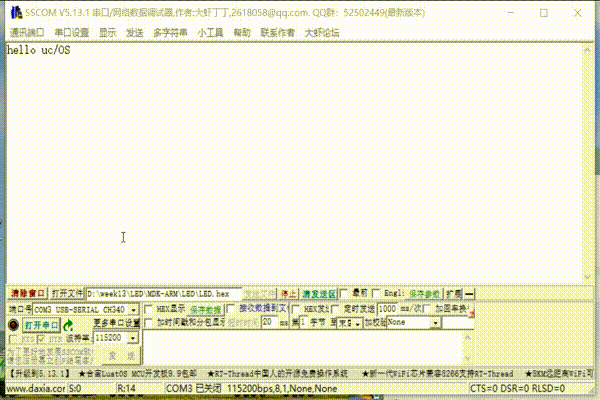
Flashing of both LED s
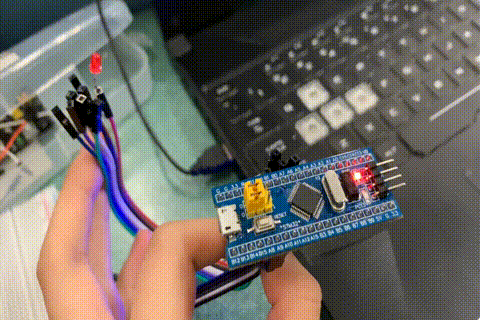
5. Waveform analysis by logic analyzer
5.1 waveform in keil simulation
Click Debug and select Debug to Debug

Select logic analyzer
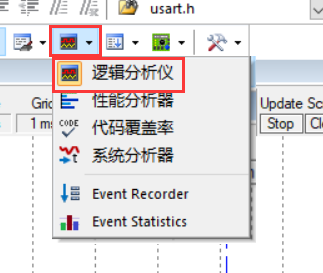
Enter the dir vtreg command in the lower left corner to see which pins are detected

Click Setup to set

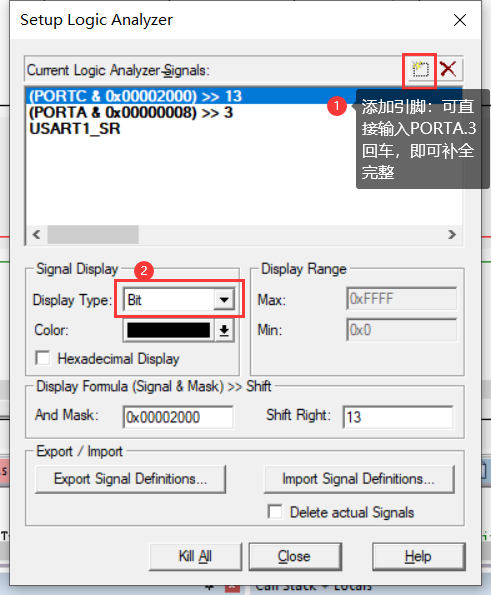 Click ① to run at full speed to observe the waveform. To stop, click ② to stop. As shown in the following figure:
Click ① to run at full speed to observe the waveform. To stop, click ② to stop. As shown in the following figure:
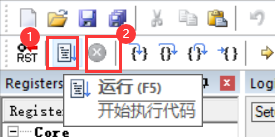
Final waveform:
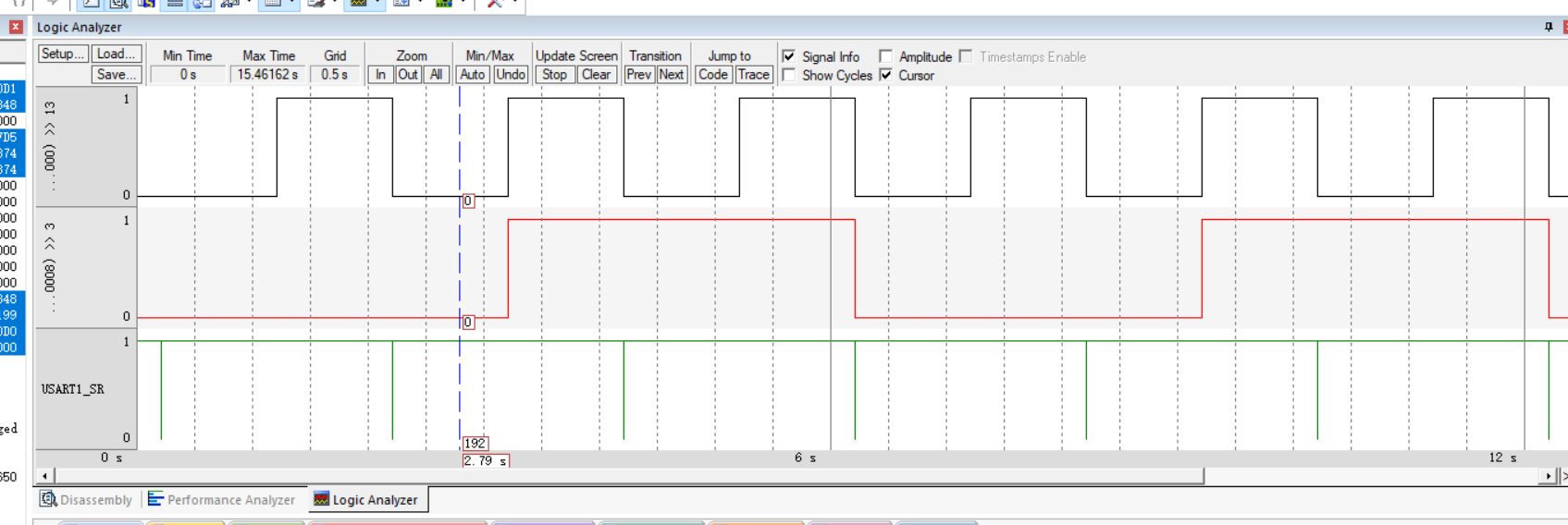
5.2 waveform in logic analyzer
Please refer to the operating instructions. pdf file of the latest SALEAE16 software for the operating instructions
Final output waveform:
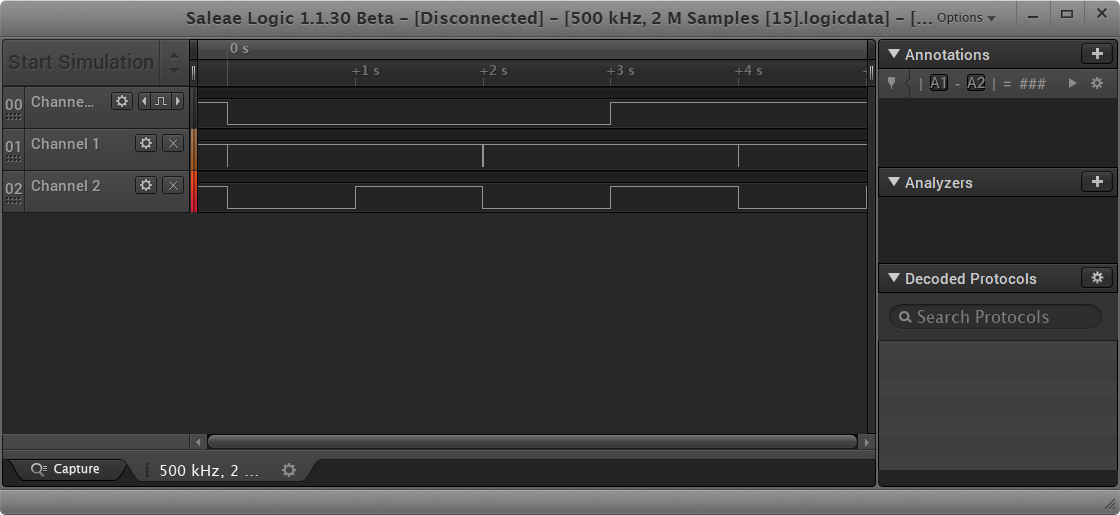 Compared with the waveform simulated by Keil engineering, it is almost consistent. Channel0 is PORTA.3,Channel1 is usart_sr, and channel2 is PORTC.13
Compared with the waveform simulated by Keil engineering, it is almost consistent. Channel0 is PORTA.3,Channel1 is usart_sr, and channel2 is PORTC.13
It can be seen that the actual cycle of A3 is 2.998s

The actual cycle of C13 is 2s
It can be seen that there is a certain gap between the actual data and the theoretical data.
Zoom in at the designated position of the mouse (where the serial port waveform is downward), and you can see:
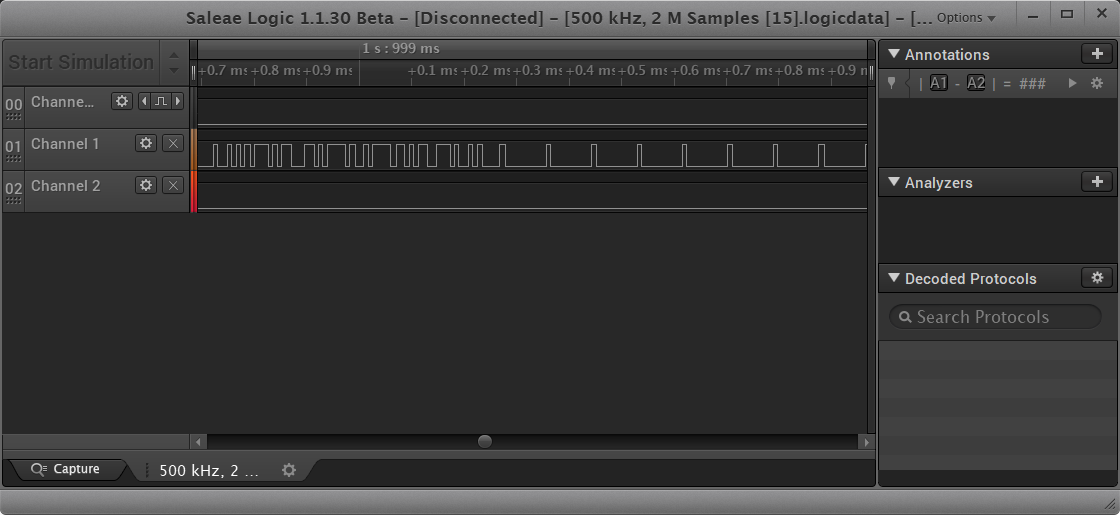 Set the level to view each character
Set the level to view each character
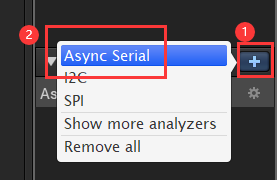
It can be seen that there are white dots (read from right to left): "h" corresponds to ASClI code 0x68 (0110 1000), "e" corresponds to ASCII code 0x65(0110 0101), "I" corresponds to ASCII code 0x6B (01101100), with free bits in the middle.

6 Summary
- When adding a SOURCE file, don't forget the. h file. The default is. c file. Remember to check the integrity after adding.
- After modification in the main function, the header file is forgotten and 30 errors are reported. Pay attention to what cannot be modified when modifying the code.
- When the simulation debugging is stuck, an. ini file should be used. Refer to the references for details.
7 reference
STM32F103C8T6 porting uCOS based on HAL Library
What is UCOS operating system and its features
KEIL5 software simulation * * * error 65: access violation at 0xe0001004: no 'read' permission